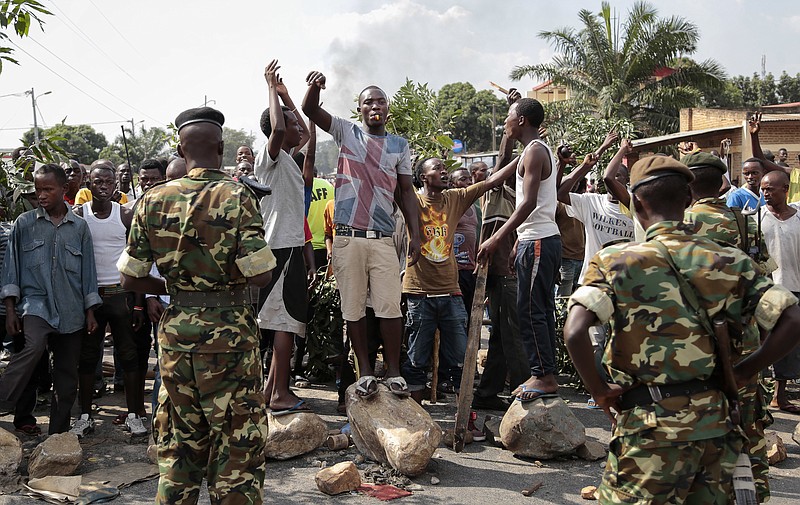UNITED NATIONS (AP) - A global human rights umbrella organization is urging Africa, Europe and the United Nations to send a civilian protection force to Burundi to prevent a possible civil war and genocide.
The International Federation for Human Rights, known as FIDH, and Burundian Human Rights League ITEKA said in a report Tuesday that the government's recent break with the international community "heralds a new intensification of repression and crimes against citizens who are considered hostile to the regime."
The 200-page report, entitled "Repression and Genocidal Dynamics in Burundi," cited several "dramatic actions" by Burundi's government in October.
They include the government's denunciation of a U.N. human rights report "quite damning of the regime," its expulsion of the African Union and three U.N. experts, its withdrawal from the International Criminal Court, and its suspension of five Burundi organizations defending human rights, including ITEKA.
War in Burundi - which is overwhelmingly Hutu - started in 1993 when Tutsi paratroopers assassinated the country's first democratically elected president, a Hutu. Fighting mainly between Hutu rebels and the Tutsi-dominated army resulted in the deaths of 300,000 people. A cease-fire was declared in 2006 but took several years for fighting to end.
The latest unrest began in April 2015 when Burundi's president, Pierre Nkurunziza, announced his decision to seek a third term, which some called unconstitutional. He won re-election, but protests turned to violence.
According to Tuesday's report, the human toll to date is more than 1,000 dead, 8,000 detained on political grounds, between 300 and 800 people missing, hundreds tortured, thousands of arbitrary arrests, and hundreds of women subjected to sexual violence.
"These abuses, committed mainly by Burundian security forces, have already forced more than 310,000 people to flee the country," it said.
FIDH and ITEKA, which have a network of observers in the country, said "crimes against humanity are being committed in Burundi today."
It cited systematic arrests, summary and extrajudicial executions, acts of torture and other acts that are "manifest" in Burundi and constitute crimes against humanity.
The rights groups then addressed the possibility of genocide.
They said the government viewed protests against a third term for Nkurunziza as a threat but after an attempted coup in May 2015, the ruling party "started to use the classic rhetoric of defending the Hutu majority as being persecuted and threatened by the risk of the return of an oppressive Tutsi military."
Soldiers from the former Tutsi-dominated army are being purged and dozens have been murdered, arrested or transferred this year, the rights groups said.
Senior officials from the defense and security forces and the ruling party also "increasingly and brazenly denounce 'Tutsis' as enemies of the regime," they said.
In a late development, FIDH released a circular from Burundi's Senate requiring every government office and public enterprise to classify employees by their ethnicity - Tutsi, Hutu or Twa - saying this was to conform with the Arusha Agreement which ended the civil war.
The rights group said that such ethnic classification isn't required under the accord.
FIDH and ITEKA said "all the criteria and conditions for perpetrating of genocide are in place: ideology, intent, security institutions and relaying ... the identifying populations to be eliminated, and the using of historical justifications."
"Our organizations warn that these dynamics are intensifying and could lead to genocide in Burundi," the rights groups said.
They also warned that "any reaction of armed opposition groups or neighboring countries - in particular Rwanda - to ensure the protection of civilian populations could signal mass murder, genocide or a new and deadly civil war."
In the 1994 Rwanda genocide, more than 500,000 minority Tutsis and moderate members of the Hutu majority were killed by Hutu extremists. It ended after Tutsi-led rebels ousted the extremist Hutu government that orchestrated the killings. Rwanda's government remains Tutsi-led.
This year, Burundi has refused to allow the African Union to send 5,000 peacekeepers and the United Nations to deploy 228 international police.
FIDH and ITEKA urged the AU, U.N., European Union and international community to "send a civilian protection force to Burundi," impose sanctions against perpetrators of serious human rights violations, and "make every effort to resume political dialogue and find a peaceful solution to the crisis."
